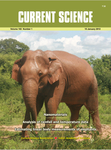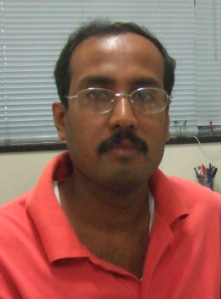Recent correspondence with Richard Zare of Stanford University brought this fragment from Robert Burns’ To a Louse to mind-
Oh wad some power the giftie gie us
To see oursel’s as others see us!
It wad frae monie a blunder free us,
And foolish notion:
What airs in dress an’ gait wad lea’e us,
An’ ev’n devotion!
 Professor Zare was at the University in December as part of our celebration of the International Year of Chemistry. He also visited other places in India and spoke with many of our leading scientists. Given his academic eminence, he has often been asked for his impressions (and advice, directions, etc.) of science in India (and also, as it happens, in China where he is on the national advisory board). I should also add that Prof. Zare, as a Foreign Fellow of the Indian Academy of Science, Bangalore is also concerned about general issues relating to science in the country… His observation that there is an undue emphasis on quantity- number of papers, impact factors, h– index comparisons, and a general overemphasis on metrics (X has more papers than Y, or Y is more cited than Z, or Z published in a journal with higher impact factor than did W, and so on) above any discussion of quality and significance of research prompted him to write a letter to the Editor of the Bangalore journal, Current Science. That letter appears this week, and has further been commented upon in the volume’s editorial by Prof. P Balaram, Editor of the journal (and, as it happens, the Director of the IISc, Bangalore and a member of the University of Hyderabad’s Executive Council).
Professor Zare was at the University in December as part of our celebration of the International Year of Chemistry. He also visited other places in India and spoke with many of our leading scientists. Given his academic eminence, he has often been asked for his impressions (and advice, directions, etc.) of science in India (and also, as it happens, in China where he is on the national advisory board). I should also add that Prof. Zare, as a Foreign Fellow of the Indian Academy of Science, Bangalore is also concerned about general issues relating to science in the country… His observation that there is an undue emphasis on quantity- number of papers, impact factors, h– index comparisons, and a general overemphasis on metrics (X has more papers than Y, or Y is more cited than Z, or Z published in a journal with higher impact factor than did W, and so on) above any discussion of quality and significance of research prompted him to write a letter to the Editor of the Bangalore journal, Current Science. That letter appears this week, and has further been commented upon in the volume’s editorial by Prof. P Balaram, Editor of the journal (and, as it happens, the Director of the IISc, Bangalore and a member of the University of Hyderabad’s Executive Council).
Zare’s letter- which has already been reprinted in the China Science Daily (!) is about Indian aspirations to improve the country’s scientific reputation. In cautiously offering advice- which he knows to be from another society in another time and in another place- Zare tells of the criteria used by the Chemistry Department at Stanford in tenuring decisions, namely in giving teachers a permanent appointment.
- First of all, they must be good departmental citizens. Our Department is a small one and we need everyone to work together for the common good.
- Second, they must become good teachers. Yes, we would be delighted if they become great teachers, but we only ask that they become good ones because everyone who really wants to achieve that status can do so. […] It really matters to us that we have good teachers for our students.
- Third, the Department wants them to become great researchers. This last criterion is the most difficult, and it presents the greatest challenge to our beginning faculty. It makes sense to us because Stanford University is primarily a research university.
(I have reformatted the above quote which is essentially reproduced from the letter.)
While we do not have such criteria for making appointments permanent in our University (or any other University) are these so difficult to ask of our faculty here? It is, in the end, more about aspiration and expectation than anything else, since nobody, not even the savants at Stanford, can guarantee outcomes…
 In his editorial this week – and this, like the letter, can all be seen online since Current Science is an Open Access journal- Balaram has a comment that is pertinent. Given our realities, he suggests, academic performance is not demanded and academic freedom often degenerates into a licence to legitimise non-performance. While the best of institutions hire faculty with some care, the majority of institutions operate under severe constraints while recruiting new faculty. There is also a vast difference between the state and central institutions, with the former being subject to considerable political pressure. Despite the many constraints and inhibitory influences, research output from India is indeed increasing both in quantity and average quality. While both the carrot and stick are used equally effectively in the West to enhance academic performance, neither is available to most institutions in India. Administrations must follow the policy of benign neglect with respect to high performers, even while turning a blind eye to the significant dead wood accumulating in our institutions. Attempts to provide incentives by the many national award schemes are unlikely to have any impact in an environment where institutions have a limited judgmental role in assessing faculty performance.
In his editorial this week – and this, like the letter, can all be seen online since Current Science is an Open Access journal- Balaram has a comment that is pertinent. Given our realities, he suggests, academic performance is not demanded and academic freedom often degenerates into a licence to legitimise non-performance. While the best of institutions hire faculty with some care, the majority of institutions operate under severe constraints while recruiting new faculty. There is also a vast difference between the state and central institutions, with the former being subject to considerable political pressure. Despite the many constraints and inhibitory influences, research output from India is indeed increasing both in quantity and average quality. While both the carrot and stick are used equally effectively in the West to enhance academic performance, neither is available to most institutions in India. Administrations must follow the policy of benign neglect with respect to high performers, even while turning a blind eye to the significant dead wood accumulating in our institutions. Attempts to provide incentives by the many national award schemes are unlikely to have any impact in an environment where institutions have a limited judgmental role in assessing faculty performance.
At the University, we are sensitive to many of these realities. The PURSE grant that the UoH received some years ago was directly a consequence of DST’s metric evaluation of our academic merit, and in general the grant has been a good thing for us, enabling research and scholarly activity for the most part. For the nation as a whole, it is also probably true that the academic output is increasing in quantity but, regrettably, it is simply not enough because the quality is, for the most part, not that great. One can only share Balaram’s closing hope that the new year and the near future will add more good citizens, good teachers and great researchers to our institutions.
 It turned out to be my year of magical living, a year of discovery and rediscovery. Among other things a time of learning an assortment of things that included, in no particular order, large scale molecular dynamics, eating properly with chopsticks (or even more properly, hashi), biking, appreciating calligraphy, ukiyo-e and the Japanese approach to aesthetics. This is pretty much what the gaijin do, so the list goes on. But perhaps above all I learned to appreciate the importance of paying attention to detail. Years later, when I went back for a visit, I could not resist taking a photograph of the manhole covers that depict their firework festival in July, something that the city is justifiably famous for!
It turned out to be my year of magical living, a year of discovery and rediscovery. Among other things a time of learning an assortment of things that included, in no particular order, large scale molecular dynamics, eating properly with chopsticks (or even more properly, hashi), biking, appreciating calligraphy, ukiyo-e and the Japanese approach to aesthetics. This is pretty much what the gaijin do, so the list goes on. But perhaps above all I learned to appreciate the importance of paying attention to detail. Years later, when I went back for a visit, I could not resist taking a photograph of the manhole covers that depict their firework festival in July, something that the city is justifiably famous for!
 This experience, that year abroad, made a deep impression on me… Okazaki, as it happens, is where Ieyasu the first of the Tokugawa Shoguns was born in 1543. From the time he took charge Japan was under the control of the Tokugawas until the Meiji Restoration in the 1860’s, three centuries when there was no contact with much of the outside world.
This experience, that year abroad, made a deep impression on me… Okazaki, as it happens, is where Ieyasu the first of the Tokugawa Shoguns was born in 1543. From the time he took charge Japan was under the control of the Tokugawas until the Meiji Restoration in the 1860’s, three centuries when there was no contact with much of the outside world.













